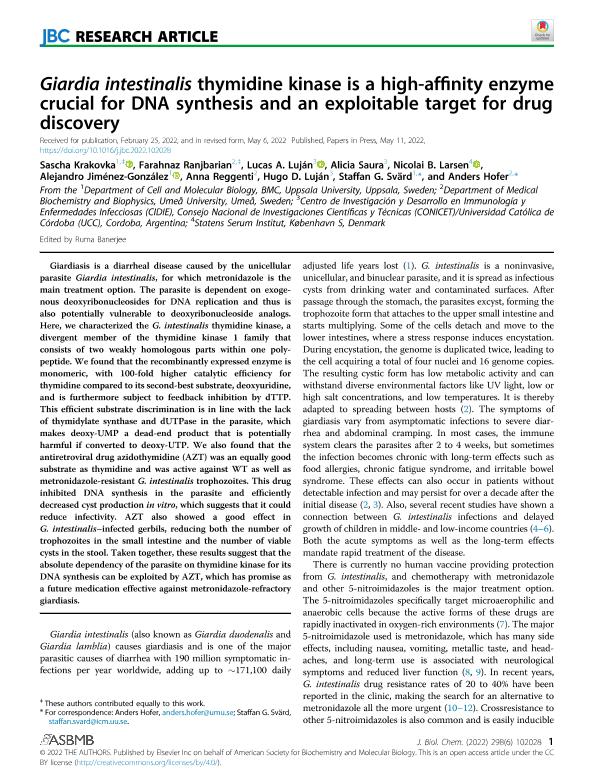Mostrar el registro sencillo del ítem
dc.contributor.author
Krakovka, Sascha
dc.contributor.author
Ranjbarian, Farahnaz
dc.contributor.author
Luján, Lucas Agustín

dc.contributor.author
Saura, Alicia

dc.contributor.author
Larsen, Nicolai B.
dc.contributor.author
Jiménez González, Alejandro
dc.contributor.author
Reggenti, Anna
dc.contributor.author
Lujan, Hugo Daniel

dc.contributor.author
Svärd, Staffan G.
dc.contributor.author
Hofer, Anders
dc.date.available
2024-01-04T15:15:29Z
dc.date.issued
2022-06
dc.identifier.citation
Krakovka, Sascha; Ranjbarian, Farahnaz; Luján, Lucas Agustín; Saura, Alicia; Larsen, Nicolai B.; et al.; Giardia intestinalis thymidine kinase is a high-affinity enzyme crucial for DNA synthesis and an exploitable target for drug discovery; American Society for Biochemistry and Molecular Biology; Journal of Biological Chemistry (online); 298; 6; 6-2022; 1-16
dc.identifier.issn
0021-9258
dc.identifier.uri
http://hdl.handle.net/11336/222423
dc.description.abstract
Giardiasis is a diarrheal disease caused by the unicellular parasite Giardia intestinalis, for which metronidazole is the main treatment option. The parasite is dependent on exogenous deoxyribonucleosides for DNA replication and thus is also potentially vulnerable to deoxyribonucleoside analogs. Here, we characterized the G. intestinalis thymidine kinase, a divergent member of the thymidine kinase 1 family that consists of two weakly homologous parts within one polypeptide. We found that the recombinantly expressed enzyme is monomeric, with 100-fold higher catalytic efficiency for thymidine compared to its second-best substrate, deoxyuridine, and is furthermore subject to feedback inhibition by dTTP. This efficient substrate discrimination is in line with the lack of thymidylate synthase and dUTPase in the parasite, which makes deoxy-UMP a dead-end product that is potentially harmful if converted to deoxy-UTP. We also found that the antiretroviral drug azidothymidine (AZT) was an equally good substrate as thymidine and was active against WT as well as metronidazole-resistant G. intestinalis trophozoites. This drug inhibited DNA synthesis in the parasite and efficiently decreased cyst production in vitro, which suggests that it could reduce infectivity. AZT also showed a good effect in G. intestinalis?infected gerbils, reducing both the number of trophozoites in the small intestine and the number of viable cysts in the stool. Taken together, these results suggest that the absolute dependency of the parasite on thymidine kinase for its DNA synthesis can be exploited by AZT, which has promise as a future medication effective against metronidazole-refractory giardiasis.
dc.format
application/pdf
dc.language.iso
eng
dc.publisher
American Society for Biochemistry and Molecular Biology

dc.rights
info:eu-repo/semantics/openAccess
dc.rights.uri
https://creativecommons.org/licenses/by-nc-sa/2.5/ar/
dc.subject
AZIDOTHYMIDINE
dc.subject
DEOXYNUCLEOSIDE KINASE
dc.subject
DEOXYNUCLEOSIDE SALVAGE
dc.subject
DEOXYRIBONUCLEOSIDE KINASE
dc.subject
DEOXYRIBONUCLEOSIDE SALVAGE
dc.subject
GIARDIA DUODENUM
dc.subject
GIARDIA INTESTINALIS
dc.subject
GIARDIA LAMBLIA
dc.subject
THYMIDINE KINASE
dc.subject
ZIDOVUDINE
dc.subject.classification
Parasitología

dc.subject.classification
Ciencias de la Salud

dc.subject.classification
CIENCIAS MÉDICAS Y DE LA SALUD

dc.title
Giardia intestinalis thymidine kinase is a high-affinity enzyme crucial for DNA synthesis and an exploitable target for drug discovery
dc.type
info:eu-repo/semantics/article
dc.type
info:ar-repo/semantics/artículo
dc.type
info:eu-repo/semantics/publishedVersion
dc.date.updated
2024-01-04T10:49:22Z
dc.journal.volume
298
dc.journal.number
6
dc.journal.pagination
1-16
dc.journal.pais
Estados Unidos

dc.description.fil
Fil: Krakovka, Sascha. Uppsala Universitet; Suecia
dc.description.fil
Fil: Ranjbarian, Farahnaz. Universidad de Umea; Suecia
dc.description.fil
Fil: Luján, Lucas Agustín. Consejo Nacional de Investigaciones Científicas y Técnicas. Centro de Investigación y Desarrollo en Inmunología y Enfermedades Infecciosas. Universidad Católica de Córdoba. Centro de Investigación y Desarrollo en Inmunología y Enfermedades Infecciosas; Argentina
dc.description.fil
Fil: Saura, Alicia. Consejo Nacional de Investigaciones Científicas y Técnicas. Centro de Investigación y Desarrollo en Inmunología y Enfermedades Infecciosas. Universidad Católica de Córdoba. Centro de Investigación y Desarrollo en Inmunología y Enfermedades Infecciosas; Argentina
dc.description.fil
Fil: Larsen, Nicolai B.. No especifíca;
dc.description.fil
Fil: Jiménez González, Alejandro. Uppsala Universitet; Suecia
dc.description.fil
Fil: Reggenti, Anna. Universidad de Umea; Suecia
dc.description.fil
Fil: Lujan, Hugo Daniel. Consejo Nacional de Investigaciones Científicas y Técnicas. Centro de Investigación y Desarrollo en Inmunología y Enfermedades Infecciosas. Universidad Católica de Córdoba. Centro de Investigación y Desarrollo en Inmunología y Enfermedades Infecciosas; Argentina
dc.description.fil
Fil: Svärd, Staffan G.. Uppsala Universitet; Suecia
dc.description.fil
Fil: Hofer, Anders. Universidad de Umea; Suecia
dc.journal.title
Journal of Biological Chemistry (online)

dc.relation.alternativeid
info:eu-repo/semantics/altIdentifier/doi/http://dx.doi.org/10.1016/j.jbc.2022.102028
Archivos asociados
